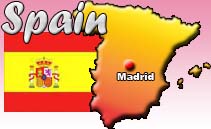Spanish judge orders first exhumations from Franco's mausoleum
 Madrid - A Spanish judge has ordered the remains of eight people to be exhumed from the Valley of the Fallen, a huge mausoleum near Madrid where many of the opponents of deceased dictator Francisco Franco are buried, the daily El Pais reported Thursday.
Madrid - A Spanish judge has ordered the remains of eight people to be exhumed from the Valley of the Fallen, a huge mausoleum near Madrid where many of the opponents of deceased dictator Francisco Franco are buried, the daily El Pais reported Thursday.
Judge Baltasar Garzon ordered the exhumations as part of his investigation into human rights abuses by Franco, who ruled Spain from 1939 to 1975 after defeating the republican government in a civil war.
The eight, most of whom were shot dead by Francoists at the start of the war in 1936, were among numerous republicans buried at the Valley of the Fallen in order to fill its crypt. The crypt was initially meant only for Francoist war victims.
The republicans buried at the mausoleum include prisoners who were forced to help build it between 1940 and 1958.
"We are going to recover (the remains of) my father and uncle ... I am very happy," said Fausto Canales, 74. The seven men and one woman were interred without the knowledge or consent of their families.
It could, however, be difficult to locate and access the graves, which are sealed by marble slabs, according to the daily.
A total of up to 60,000 Francoists and republicans are believed to be buried in the Valley of the Fallen, where a huge basilica built into a mountainside also holds the tombs of Franco and Jose Antonio Primo de Rivera, the founder of the Falangist party, which lent key support to the Franco regime.
Socialist Prime Minister Jose Luis Rodriguez Zapatero's government has passed a law aimed at rehabilitating the memory of Franco's victims, including support to associations which have dug up the bones of thousands of people from mass graves in order to give them new burials.
The government has, however, not given orders concerning the Valley of the Fallen, allegedly to avoid friction with the opposition conservatives, who oppose a re-evaluation of the Franco era.
Garzon estimates that more than 100,000 Franco opponents were killed in acts of repression during and after the war.
Both sides committed atrocities during the war. However, the Franco regime paid tribute to its own dead, while tens of thousands of republicans were left in mass graves.
Garzon's investigation is the first judicial one into Franco's crimes in Spain. After the dictator's 1975 death, national leaders agreed to look forward and not dig into the past.
Prosecutors have appealed against the investigation, arguing that Franco's abuses cannot be regarded as crimes against humanity. (dpa)